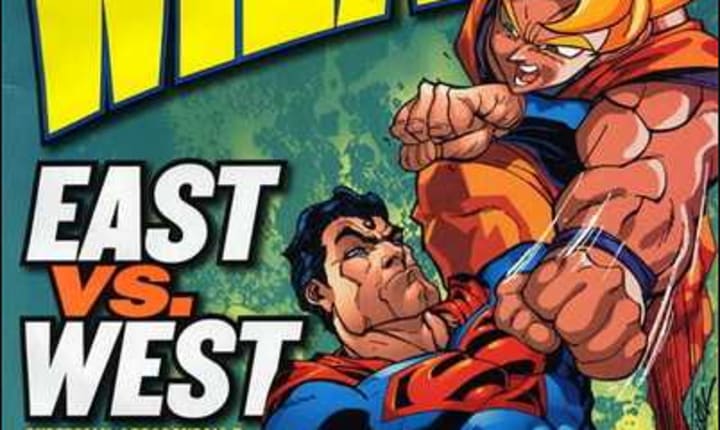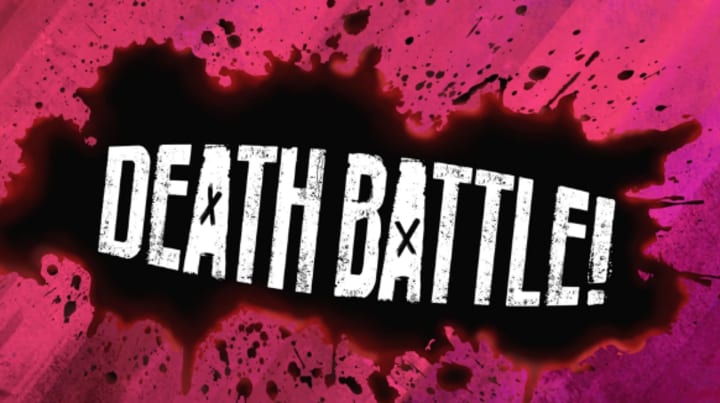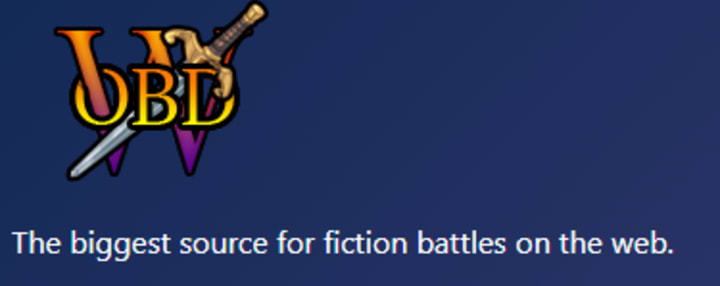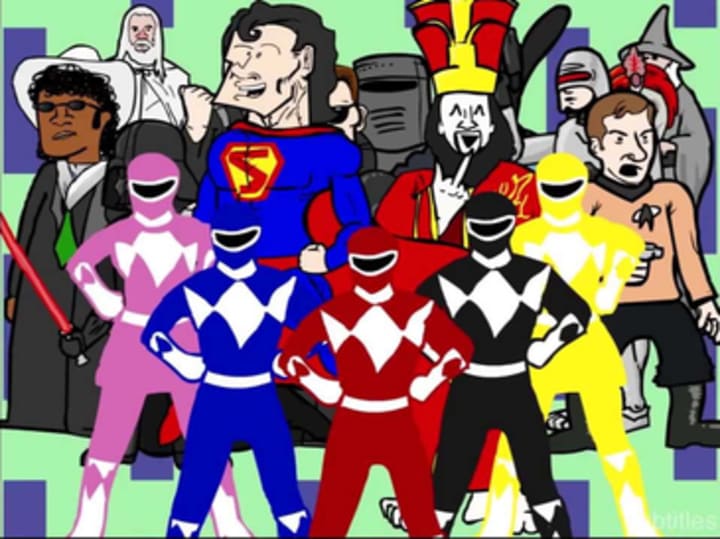Versus Sites and Battle Boards
The history of debating which fictional character will win in a fight

Who would win in a fight? Batman… or Spider-Man? Superman… or Goku? A Medieval Knight… or a Feudal Samurai?
Every nerd, geek, bookworm, or gamer has come across at least one of these questions when discussing their favourite medium or character. While the world debated about which political candidate is better, or what philosophy is more meaningful, or simply what new high-tech gadget is superior, in the realm of fans, fanboys, and fandoms, the most common debate you’ll hear is which fictional character is the strongest.
By the dawn of the internet age, online communities have been created solely for the purpose of debating about this topic. This led to the birth of a new internet subculture, complete with its own slang, style, and silliness.
Welcome to the realm of versus sites, also known as battle boards. It has an interesting history, from humble beginnings in magazine pages, to the vast character catalogue-filled wikis in today’s internet. In this article, we will explore its yet-to-be told history, some of which has been lost in time.
Origins

The idea of debating which individual will win in a fight was first recorded, oddly enough, in Ancient Rome. According to a documentary by Invicta, early gladiators in the Roman era wore costumes of people and nations they had defeated or subjugated, including their weapons and armour. These gladiators or gladiator-types were named after these people, such as the Samnites and the Celts. There were records at that time that told how Roman spectators discussed which weapon, armor, and warrior culture as a whole, were superior enemies to Rome, and what might have happened if ever these two cultures fought against each other.
However, versus debating really began in the columns of the predecessor of the internet: magazines. Gladiators gave way to athletes, and soon, there were articles in sports magazines that discussed which athlete was superior. Some of these articles delved into combat sports, such as the May 1997 issue of Black Belt Magazine that talked about who would win in a fight between Muhammad Ali and Bruce Lee. The letter columns of comic books also became a place where people could share their opinions on which fictional character was better. Comic book writers and editors placated these burning questions by creating epic stories, like the Justice League/Avengers crossover, Lobo vs Mask, or Batman vs Punisher. Funny enough, even today, writers love pitting Batman against virtually everyone, like Batman vs Spawn, Batman vs Predator, and Batman vs Judge Dredd.
A landmark in versus debating happened in issue 133 of Wizard Magazine titled “East vs West”. Inside were articles that pitted comic book characters against manga characters, from Superman vs Son Goku to Spider-Man vs Vash the Stampede. The writers of the magazine wrote detailed descriptions and tale-of-the-tapes of the characters, as well as explanations on which character they think would win. This issue of Wizard Magazine paved the way for the format and style of what would become battleboarding. It was also the first to discuss the topic of Superman vs Son Goku, and sure enough, it would not be the last.
Versus Shows

Other great inspirations behind versus sites were television and web shows. Many shows over the years had premises that were about pitting one fighter against another. Unlike today’s battle boards, people have little to zero participation in choosing a winner. Each show had their own way of making a verdict. However, in a time when the internet was not yet as widespread, these shows became the first exposure for many when it came to hypothetical fights, influencing them years later.
The first to become popular was the 2004 Discovery Channel show called Animal Face-Off. In this show, biologists discussed who would win in a fight between certain animals living in the same environment (like Wolf vs Cougar or Great White Shark vs Saltwater Crocodile). To help in their debates (which were more like cheesy fake banters), mechanical engineers created badass machines that consisted of animal skull-shaped metallic heads and claws, propped on a vehicle and powered by pistons. These were used to test and simulate how strong a certain animal’s bite force or claw scratch was. Data from these tests were then compared, and animators created CGI fights between these animals to simulate what might happened if they ever fought. The host then gave an explanation on why that animal won the fight. It was memorable for a lot of people and made a name for scientists like Dave Salmoni in the nature documentary business. It inspired other television channels (even other academic channels) to make their own action-pack versus shows, from History Channel’s Jurassic Fight Club, to Spike’s Deadliest Warrior.
The next influential versus show was Spike’s action documentary series called Deadliest Warrior. First premiering in 2009, unlike Animal Face-Off that pitted animals, the show was all about pitting historical warriors from different time periods against each other. Sometimes, they also delved into pitting which modern military unit was superior. In this show, a team of scientists, engineers, doctors, programmers, historians, and combat experts discuss two different warriors and their history, as well as showcasing how deadly each warrior’s weapons were.
Episodes include Viking vs Samurai, Green Berets vs Spetsnaz, Attila the Hun vs Alexander the Great, and at one point, even Vampires vs Zombies. Weapons would be tested, each warrior’s history and “x-factor” were analysed, before finally, all data were inputted in a simulation program. A dramatised fight sequence between actors portraying the warriors were then shown, followed by the announcement of the winner and why said winner won. Although it lasted only three seasons due to its expenses, the show became a sensation, spawning a video game series, podcasts, and even various fanfiction, such as the popular Deadliest Fiction.
The last influential show in this article is the 2010 ongoing web series Death Battle, which was first hosted by ScrewAttack but is now owned by Rooster Teeth. It is the geekiest of all these shows. Instead of pitting animals and historical warriors, the show pitted fictional characters from comics, shows, movies, games, anime, and even memes against each other — a difficult feat knowing how crazy and complicated fiction can be. Episodes include Bobba Fett vs Samus Aran, Master Chief vs Doomguy, and of course, Superman vs Son Goku. There are two characters that serve as hosts: the genius scientist Wiz who presents the scientific explanations and mathematical calculations of the fictional characters and their powers, and the street-smart redneck Boomstick who talks about weapons, armour, gadgets, and other badass feats from said fictional characters.
Like in Animal Face-Off and Deadliest Warrior, the show presents and discusses these characters, their capabilities, and weaknesses, before creating an animated simulation on how their hypothetical fight might end. Behind the scenes, Death Battle relies on internet experts to determine which character will be victorious. Although the show has had its controversies (and wrong information), it became a smash hit, becoming one of the oldest-running web shows of its kind, and is currently one of the most popular shows online. It inspired similar web shows like Super Power Beat Down and Grudge Match.
Battle Forums

The mid-2000s marked the dawn of the modern age of the internet. Gone were the bulletin and message boards, now replaced with threads and forums. And these internet forums became the home for a variety of topics, including character-versus-character debates. The year 2006 saw the first appearance of a website dedicated to American comic books called Comic Vine. While it published mostly comic book articles, the site also housed its own forums. One of these forums is called the Battle Forum, and here, users can post hypothetical fights between fictional characters. The earliest post was in 2007 by user “Nameless one” which pitted Gambit from Marvel Comics and Gambler from DC Comics. It would be the first of many.
Other similar sites to Comic Vine like Anime Vice and Giant Bomb tried to make their own battle forums, but Comic Vine is the only one that stood the test of time. Its earliest post also witnessed probably the first recorded example of flaming in a battle board. Additionally, the site was also the origin of many terms used in versus sites today, such as “power scaling”, “scans”, and “respect threads”. Other slangs that have also become commonplace in many versus sites like “bloodlusted”, “speed equalized”, “wanking”, “preps” and “BFR”, either originated from Comic Vine or were popularised by it. Even the Comic Vine staff joins in the fun from time-to-time, creating articles like Batman vs Wolverine. User “jashro44” is currently the one with the most posts, and arguably, a legend in the Battle Forum.
Similar battle forums in various websites began popping up, like KillerMovies, Yahoo Answers, Quora and Naruto Forums. Even art sites like Deviant Art and fanfiction sites like FanFiction also have posts relating to battleboarding, complete with detailed texts and fan art. Many blogs about pitting fictional characters also appeared in the internet (many of which were posted in Blogger), like that of dreager1.com. Naruto Forums (now known as FanVerse) became a popular site for people to post “calcs”, mathematical calculations that try to determine how strong a character is or his/her attacks. However, the site that had the next big impact in the evolution of battleboarding was Reddit, specifically, its subreddits r/respectthreads and r/whowouldwin.
Besides Comic Vine’s battle forum, Reddit’s r/whowouldwin is currently one of oldest yet most active battle forums in existence. Like Comic Vine, users (or redditors) post hypothetical matches that range from serious (like Iron Man vs Green Lantern) to downright surrealistic (10 angry chimpanzees vs an 18-wheeler sized-praying mantis). What made this forum great is the way they debate on these matches. The subreddit prides itself as a scan-only evidence-based forum. And they’re pretty strict about it too, complete with their list of rules and policies that needed to be followed and updated. Here, elements that other versus sites use like fan calculations, tiers, and sometimes even power-scaling, are seldom used and are even frowned upon. Instead, r/whowouldwin relies mostly on scans from actual comic books and mangas, clips from shows and films, and screenshots of books and author notes, all compiled in respect threads and catalogueed in its affiliated subreddit: r/respectthreads. Even today, other battle boards are dependent on r/respectthreads in many of their profiling and assessment. They are also the one that popularised the term “composites”, like their “Composite Humanity” character.
Dedicated Sites

The popularity of battle forums inspired many to create websites that were inspired by or are dedicated primarily for hypothetical match-ups, such as The Outskirts Battle Dome and the Space Battles, the latter of which is still very active to this day. The Outskirts Battle Dome may not be that popular today, but its style and format have influenced contemporary versus sites. In this site, people can create “profiles” of their favourite fictional characters, from their name and origin, to their powers, destructive capabilities, and weaknesses, which are then used as references in debating. It popularised the term “power levels” and “character profiles” in versus debates (i.e. if a character can destroy a planet, then said character is considered “Planet-Level”).
A unique versus site also appeared during this time, known as Fact Pile. Run by someone calling himself the admin, Fact Pile was a place where users debated about hypothetical fights. The site was neat, nicely catalogued, and had colourful pictures and designs. A weird thing about it was that users were not the ones who posted match-ups. The fights were posted by the admin which were then debated upon by its users. If a user wanted the admin to post a hypothetical fight they wanted to see, they had to pay him a certain fee.
Nonetheless, it used to be a popular versus site that had its own Youtube channel, wikia, and even a separate forum called FactPileTopia where users could post their hypothetical fights without paying. Another thing that made it special at that time was that the winners of Fact Pile were listed by the admin, unlike other battle forums whose fights are seldom concluded and never recorded. However, the site closed down in 2016 and many of its history became lost. An interesting note: they also made their own Superman vs Son Goku.
Battle Wikis

The arrival of 2010 marked a new era in versus sites with the rise in popularity of wikias. Wikia (now known as “Fandoms” with a capital “F”) is a wiki-hosting site that copies the format of Wikipedia. Essentially, it’s a site where people can create their own wikipedias of their favourite shows, games, series and fandoms. It’s easy to use and is free, making it a popular choice for any netizen who wants to publish something online. Through wikia, many versus sites and battle boards were born.
The earliest were the ones that were inspired by shows like Deadliest Warrior and Death Battle. The first and most-influential versus wiki was Deadliest Fiction, a wiki inspired by Deadliest Warrior, which was created in July 2010. Here, users can create written fan-made episodes of Deadliest Warrior, ranging from historical warriors to fictional characters (sometimes even having historical fighters fighting against fictional characters like Hannibal Barca vs Zombies). Deadliest Fiction has a unique format from others of its kind. Users generally publish a blog that talks in great detail (with pictures) about the warriors and characters they are pitting against. Other users then analyse the data in this blog, including weapons, powers, and “x-factors”, and write a well-detailed vote on who will win. Users are also encouraged to debate another user’s vote if they feel like it is false or wrong (called a “rebuttal”). After a certain amount of time (minimum is three days), votes are tallied and the user writes a “battle”. The winner in that battle is the one chosen by the voters. There are some variations to their format, like user tourneys (where users create their own characters) and battle royales (where more than three characters are pitted against each other).
Of all the versus wikis today, Deadliest Fiction is the simplest and most unique with good levels of accuracy. It is also the most fun since it’s also a fanfiction, with great fights that include the “Holy Grail War”, Varangian Guard vs Praetorian Guard, and of course… Superman vs Son Goku. That being said, they are the smallest, and also the most restrictive since they do not allow cartoon or joke characters like Spongebob Squarepants. They also had affiliated wikias like Deadliest Beasts (that are about animals) and Deadliest Joke (that are about cartoon characters) but these had been largely defunct.
A user from Deadliest Fiction named “Justin.sommers.50” left the wiki and formed Death Battle Fanon Wiki, a wiki fanfiction site inspired by Death Battle. In this wiki, users can make their own episodes of Death Battle, including lines of dialogue for Wiz and Boomstick. Match-ups are posted as wiki articles, but there is a comment section where users can comment their opinion. The winners of these match-ups are determined by the author, not other users, and while back then, users and admins can unanimously have the verdict changed if the majority disagrees with it, this policy has been stopped in favour of making the site purely for fanfiction. Anyone can make their own episodes of Death Battle here, with some of the best ones being Son Goku vs Sailor Moon, and crazy ones bordering on meta-humor like Magicarp vs Beebop and Rocksteady (where flipping Magicarp actually won!).
In October 2010, a user by the name of “Galaxyian Pyro” created a little battleboarding wiki called VS Battles Wiki. He created pages, edited them for over a year or so, and left. Little did he know that he created probably the largest, most active, and most popular character profile and battleboarding site today. In VS Battles Wiki, users can do two things: create and revise character profiles, and debate which characters would win in a fight. The wiki has a character profile format inspired by The Outskirts Battle Dome, but the former has its own unique tiering system such as overall tier, attack potency, durability, speed, etc. These profiles are all, almost always, in a state of revision in order to keep every information updated, accurate, and free from “lowballing” or “wanking”. Accurate character profiles are essential because these are used as references when users begin debating about characters in the forums (also known as “versus threads”).
In versus threads, users can make posts pitting one character against the other in very specific scenarios. Admins can be meticulous when it comes to these, and users are recommended to include conditions such as the range at the start of the fight, the availability of preparations, and whether “speed is equalized”. Other users debate on the characters, and can choose whether one character wins or whether the fight ends inconclusively. A character needs at least 7 votes, with a minimum of a 3-vote difference, to win. Victories are then added to their character profiles. VS Battles Wiki is the pinnacle of a versus site. It has everything that many of the pioneering battle boards have from forums, profiles, calcs, scans, and rules, while also adding more to the overall budding community with its revisions and a detailed list of battleboarding terms and fallacies. Everything is well-organised; admins are divided into different groups with their own specific function (like groups responsible for calculations and human resources, respectively, etc), and characters are indexed according to their tiers.
That being said, it did have its problems. Throughout the years, VS Battles Wiki has seen many controversies, from simple criticisms to the accuracy of their character profiles, users forging and faking scans and translations, admins paying other users for supports and votes (the WeeklyBattles affair), and just downright bad behaviour and discrimination (like the debates surrounding the gender of Bridget from Guilty Gear). However, its achievements outweigh its problems. Right now, VS Battles Wiki has over 30,000 articles and a 1 million visitors per month, making it one of the most active wikia, and definitely the most active battle board today. Its achievements are most noteworthy. At one point, the site accumulated enough support and resources from its users to design and create its own external forum. That’s how VS Battles Wiki rolls.
Battleboarding Today

There’s no denying the influences that versus sites and battle boards have in both geek culture and the internet culture. From the unique terms it popularised, to the media that it helped create. Without battle boarding, there might not be an “Ultimate Showdown of Ultimate Destiny”, no SeththeProgrammer or Jobbers and Goons ranting about in Youtube and Twitter, and maybe no fun stories like Otaku Girl.
Nowadays there have been a ton of new versus sites and battle boards, like One Minute Melee Fanon Wiki, Versus Debating Wiki, Joke Battles Wiki and many others. As long as new stories are published and new fandoms rise, there will always be that burning question in everyone’s mind, and a home for those who want that question answered:
“Who will win in a fight…”
About the Creator
Carl Hannigan
Self-acclaimed connoisseur of the literary arts. Famed warlord in the wars against typos. Lover of the sweet books and magnificent prints. TL;DR I'm a book nerd and editor :D






Comments (2)
Howdy. I'm, as my name betrays, Mr. Bambu, an administrator of VS Battles Wiki. You reference something here I was involved in, the case of WeeklyBattles (a former administrator himself) being accused of bribery. I want to clarify something on this topic, partially on his behalf- I do not like WeeklyBattles, but the truth is important and a fellow staff member convinced me to speak up. WeeklyBattles did not bribe anybody. Weekly was banned for attempting to bribe me to change an evaluation on a calculation he made. It is worthy of note, in the name of remaining neutral, that Weekly contends that his offer of bribery was a joke that people didn't understand. The VS Battles staff did not accept this explanation as likely, and so his punishment remained. I doubt it would make a substantial difference, but for Weekly's sake, I would consider it a favor if you rephrased the article as it currently is to clarify these truths- that no bribery was committed (only attempted), and that Weekly maintains his innocence by claiming it was a joke. That's about all I have to say, thanks for your time in advance.
Hey DF user here. The community loves the shout out you have given us. Just to be clear tho, people can use cartoon characters along as said character follows our defintion of a fighter, so SpongeBob would definitely be allowed. Keep up the good work tho!